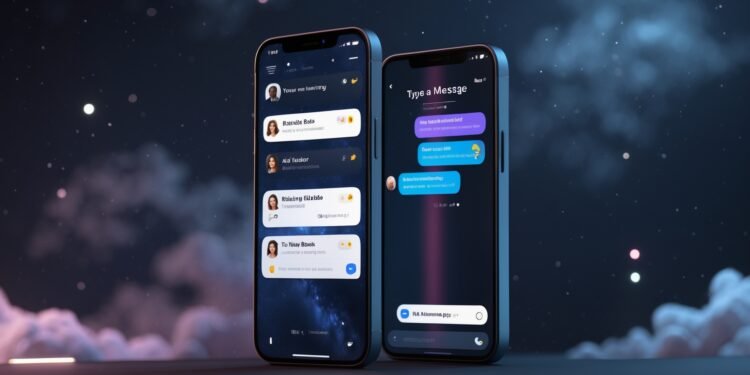The world of mobile messaging is undergoing a major transformation with the latest update to Rich Communication Services (RCS), which now includes end-to-end encryption (E2EE). This long-awaited security enhancement makes RCS a more competitive alternative to traditional SMS and aligns it with modern messaging platforms like WhatsApp, Signal, and iMessage.
In a significant move, both Google and Apple have confirmed their support for RCS, marking a milestone for cross-platform messaging security. With RCS adoption growing, this update strengthens privacy and security while improving user experience.
Let’s explore the impact of end-to-end encryption in RCS, the role of Google and Apple in shaping its future, and what this means for mobile users worldwide.
What Is RCS and Why Does It Matter?
RCS (Rich Communication Services) is an advanced messaging protocol designed to replace SMS and MMS. Unlike traditional text messaging, RCS offers:
- High-resolution media sharing (images, videos, and audio).
- Typing indicators and read receipts.
- Group messaging support with improved reliability.
- No character limits, unlike SMS.
RCS has been widely promoted by Google as the next-generation messaging standard, particularly for Android users. However, one of the biggest criticisms of RCS until now has been its lack of end-to-end encryption, making it vulnerable to potential security threats.
End-to-End Encryption: A Game-Changer for RCS Security
With the latest RCS update, end-to-end encryption (E2EE) is now a standard feature, ensuring that messages are secure and private from sender to recipient.
How End-to-End Encryption Works in RCS
- Messages are encrypted on the sender’s device and can only be decrypted by the recipient’s device.
- Even Google, Apple, and mobile carriers cannot access the message contents.
- This prevents eavesdropping, hacking, and unauthorized interception.
Benefits of End-to-End Encryption in RCS
🔒 Enhanced Privacy – Ensures that personal and business conversations remain private.
📵 Protection from Hackers – Prevents cybercriminals from intercepting messages over unsecured networks.
📑 Regulatory Compliance – Meets global privacy standards, such as GDPR and CCPA.
Previously, encryption in RCS was limited to one-on-one chats, but this update now extends E2EE protection to group chats—a critical step toward making RCS a full-fledged competitor to encrypted messaging apps.
Google and Apple Confirm RCS Support
For years, Google has been advocating for widespread RCS adoption, pushing mobile carriers and device manufacturers to integrate the protocol. However, Apple remained a major holdout, preferring its proprietary iMessage for iOS users.
Apple’s Decision to Support RCS
In a surprising move, Apple has confirmed that it will support RCS in iOS starting in 2025. This decision is expected to:
- Improve cross-platform messaging between iPhones and Android devices.
- Enhance media quality, group chat experience, and security for non-iMessage users.
- Reduce reliance on outdated SMS when communicating across different operating systems.
While Apple will still maintain iMessage for its ecosystem, RCS support means that messages between iPhones and Androids will no longer default to unencrypted SMS, addressing a long-standing frustration among users.
Google’s Continued Push for RCS Adoption
Google has been the biggest RCS supporter, integrating it into Google Messages and partnering with carriers worldwide. The addition of E2EE encryption now strengthens Google’s case for RCS as the default messaging standard on Android.
With Google and Apple onboard, RCS is now set to become a universal standard for secure messaging.
How RCS with End-to-End Encryption Impacts Users
The shift to RCS with full encryption is a major win for consumers. Here’s what it means for everyday mobile users:
✅ Better Security – No more relying on insecure SMS when texting across devices.
✅ Seamless Messaging – Improved chat experience between iPhone and Android users.
✅ Higher Media Quality – Photos and videos will maintain resolution across platforms.
✅ Improved Group Chats – More reliable and feature-rich than SMS group messaging.
For businesses, RCS Business Messaging also benefits from improved security, making it a more viable platform for customer service, notifications, and transactions.
The Future of RCS and Secure Messaging
The inclusion of end-to-end encryption and Apple’s support sets the stage for RCS to become a global messaging standard. However, challenges remain:
- Widespread Carrier Adoption: While many networks support RCS, some still rely on older SMS infrastructure.
- Integration with Third-Party Apps: Can RCS compete with encrypted apps like WhatsApp, Signal, and Telegram?
- Apple’s Implementation: While Apple has confirmed RCS support, details about its exact integration and encryption policies remain unclear.
Despite these hurdles, RCS is now more secure and widely accepted than ever. With Google and Apple aligning on a messaging standard, the era of fragmented and insecure text messaging may finally be coming to an end.
Final Thoughts
The latest RCS update with end-to-end encryption marks a turning point in mobile messaging. With both Google and Apple on board, users can expect a more secure, feature-rich, and seamless messaging experience across platforms.
As RCS adoption grows, it may replace SMS entirely, providing an encrypted, modern communication standard that benefits both individuals and businesses. While questions remain about Apple’s exact implementation and carrier adoption, one thing is clear: the future of messaging is safer, smarter, and more interconnected than ever.
🚀 Get ready for the next era of mobile messaging!

















